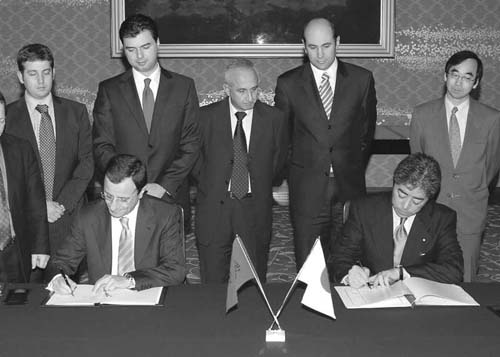Japan's Official Development Assistance White Paper 2006
Main Text > Part II ODA DISBURSEMENTS IN FISCAL YEAR 2005 > Chapter 2 Details about Japan's ODA > Section 3. Assistance for Each Region > 8. Europe
8. Europe
Japan's bilateral ODA to the European region in 2005 was approximately US$ 320.61million, 3.1% of total bilateral ODA.
Chart II-33 Japan's Assistance Disbursements in Europe

After the collapse of Communist regimes in 1989, Central and Eastern European regions began making efforts toward market economies and democratization. In line with such developments, the G24 (East European Countries Donor's Meeting) led by the European Union (EU) was established. Japan joined step with the international community and has been providing assistance to Central and Eastern Europe and the three Baltic countries for many years.
Today, the degree of development varies greatly among the countries in Central and Eastern Europe. Eight countries including the three Baltic countries (Poland, Hungary, the Czech Republic, Slovakia, Slovenia, Latvia, Lithuania, and Estonia) have actively advanced domestic reforms while receiving assistance from various countries, and acceded to the EU in May 2004. Japan has provided continuous and wide-ranging assistance for stable transitions by improving the lives of citizens who experienced economic and social difficulties that accompanied transitions. Currently, as these new EU member states are already switching over from being recipient countries to donor countries the assistance environment for the European region is also changing. Under the circumstances, the role of Japan's assistance is also changing, and it is necessary to shift its assistance to regions and sectors with higher needs. In the European region countries with high priority for assistance are shifting to those which are less developed, such as Western Balkan countries from Bosnia and Herzegovina to Serbia and Montenegro, as well as countries like Ukraine and Moldova.
Effective and efficient assistance, which matches the level of economic development of each of these countries and produce more solid results, must be provided to the eight new EU member countries mentioned above, as well as Bulgaria and Romania which are scheduled to accede to the EU in 2007. Furthermore, for countries where economic development is advanced, it is necessary to search for new ways of bilateral cooperation with a view to graduation from ODA. Japan intends to use the results from ODA provided previously to promote cooperation with private sectors and research institutes like universities. Meanwhile, Japan will also share its experience as a donor country to assist countries which are transitioning from being aid recipients to donors.
On the other hand, countries in the Western Balkans which suffered considerable damage as a result of the conflict in the 1990s are finally moving from a stage of restoration and reconstruction to a stage of development with a view toward EU accession in the future. In April 2004, Japan co-hosted with Ireland, which held the Presidency of the EU, the Ministerial Conference on Peace Consolidation and Economic Development of the Western Balkans in Tokyo attended by ministers of Western Balkan countries, donor countries, and international agencies. At the conference, Japan emphasized the importance of consolidating peace through ethnic reconciliation and promoting sustainable economic development, stressed the necessity to tackle common issues faced by Western Balkan regions such as organized crime and high unemployment rates by advancing regional cooperation, and announced to continue providing assistance to support efforts to these ends.
For the Western Balkan region, Japan has been rebuilding infrastructure that had been damaged during the conflicts and has been providing assistance focused on the health and medical care sectors for years. As assistance for contributing to moving to a market economy in accordance with each country's development stage, Japan has been dispatching experts to promote investment and providing training to develop SMEs and facilitate trade. From the standpoint of consolidating peace, Japan has been inviting police officers from Serbia and Montenegro and Kosovo to provide them with training to enhance security measures. It has also been providing assistance to NGOs for clearing landmines, as well as assistance for ethnic reconciliation through ITC education in Bosnia and Herzegovina. In the environmental sector, which presents a common challenge within the Balkan region, Japan has been sending experts and providing training, as well as engaging in cooperation through development studies to address soil and sewage contamination in the former Yugoslav Republic of Macedonia and Albania.

Foreign Affairs Vice Minister Midori Matsushima attending the completion ceremony of Doboj Bridge, Midori under Japan's grant aid (Bosnia and Herzegovina)


Foreign Affairs Senior Vice-Minister Takeshi Iwaya signing a technical cooperation agreement with the Republic of Albania
In Ukraine, which is in the European region of the former Soviet Union, President Viktor Yushchenko was inaugurated in January 2005 and democratization has progressed. Against this backdrop, bilateral relations with Japan have strengthened, as evidenced by the visit of President Yushchenko to Japan in July 2005, as well as the visit of Foreign Minister Taro Aso to Ukraine in July 2006. In view of such developments, Japan will collaborate with the international community to support the efforts of Ukraine for further democratization and transition to a market economy. In FY2004 Japan offered cooperation to Ukraine through yen loans for the Boryspil State International Airport Development Project, and provided grant aid in FY2005 aimed at economic structural improvements. For Moldova, which is the least developed country in the European region and whose primary industry is agriculture, Japan has been providing agricultural machinery and tools as part of its assistance to impoverished farmers and has made a large contribution to the country's self-sufficiency ratio of agricultural products. Japan intends to provide continued assistance in the future.


 Next Page
Next Page